I’m ‘obsessed’ with tennis – Sherifpublished at 14:22 BST 26 May 2023
Mayar Sherif says people told her it was “impossible” to be Egyptian and good at tennis.
Read MoreMayar Sherif says people told her it was “impossible” to be Egyptian and good at tennis.
Read MoreSamba Cyuzuzo
BBC Great Lakes
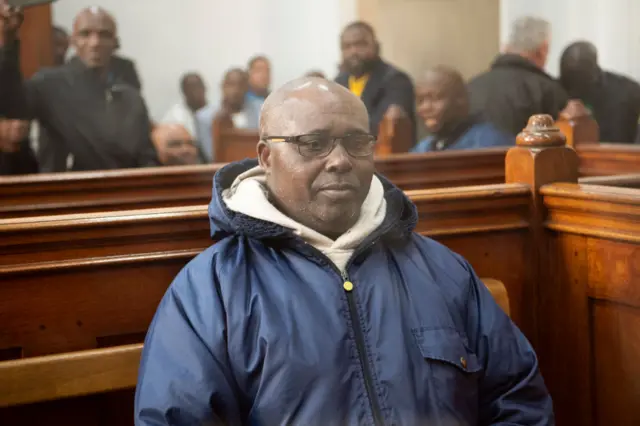 Image source, AFP
Image source, AFPFulgence Kayishema was arrested after 22 years on the run
Rwandan genocide suspect Fulgence Kayishema has appeared in court in Cape Town after his arrest on Wednesday, ahead of his pending extradition to Rwanda.
South African police spokesperson Brigadier Thandi Mbambo earlier told the BBC that it was a "big and lengthy operation" to arrest him - one of the most wanted people in connection with the 1994 Rwandan genocide.
Mr Kayishema, 61, “has used a number of false identities, and during the time of his arrest he was found to be calling himself Donatien Nibashumba”, Brig Mbambo said.
The former police inspector was charged in 2001 over the killing of more than 2,000 ethnic Tutsi men, women and children inside a Catholic church where they had sought refuge.
Some 800,000 Tutsis and moderate Hutus were killed in the genocide.
According to the indictment, Mr Kayishema directly participated in the planning and execution of the massacre at the Nyange church in Kivumu, Kibuye prefecture, on 15 April 1994.
It says Mr Kayishema and others tried to burn the church down with the refugees inside. When this failed, they bulldozed it, burying and killing all those hiding there.
Their corpses were then buried in mass graves. He reportedly faces five charges in South Africa, including for fraud, however he was not asked to enter a plea, Reuters news agency reports.
Mr Kayishema told journalists in the courtroom that he had no role to play in any violence, according to Reuters.
He “was working as a labourer in a big farm” in Paarl nearly 60km (37 miles) west of Cape Town, police say.
“When he was arrested, he was staying alone, his family is in Cape Town, there are certain things that are going to be subject of investigation, but he was staying alone in the farm,” Brig Mbambo added.
More about the Rwandan genocide:
 The Newsroom
The Newsroom
BBC World Service
The government of national unity in Libya says it has carried out air strikes against criminal gangs involved in trafficking people, drugs and fuel.
Residents in the western city of Zawiya said they heard explosions.
It has seen sporadic clashes between factions that back and oppose the Tripoli-based administration, which is one of two rival governments in Libya.
It's not known to have any air force of its own, but has used drones belonging to its Turkish military allies in the past.
Libya remains in political chaos after the failure of a UN-backed process to unify its divided factions last year.
Despite repeated calls for help, the man and his disabled wife were not assisted, his family says.
Read More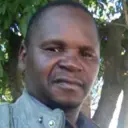 Jose Tembe
Jose Tembe
BBC News, Maputo
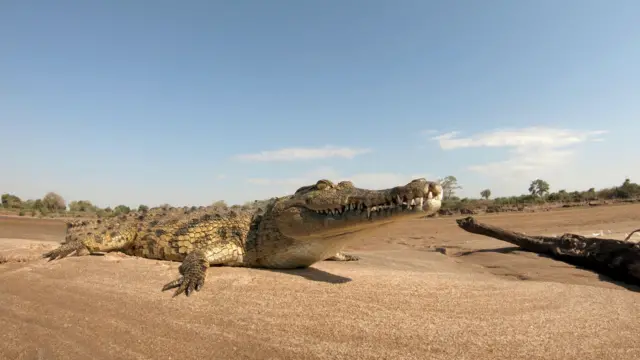 Image source, AFP
Image source, AFPThe government in Mozambique is resettling people affected by wildlife attacks
More than 1,000 families are set to be displaced in central Mozambique following attacks by wild animals.
The head of the local administration in Marromeu district in Sofala province said the local government would transfer 1,500 families threatened by the attacks.
Henriqueta de Rosário said authorities had recorded the deaths of three people from attacks by wildlife in the first quarter of this year.
Buffaloes from the Marromeu Special Reserve in the Zambezi river delta have invaded residential areas, forcing the population to move to the river islands.
However, as they seek refuge on the islands, they face the threat of crocodile attacks.
"The conflict between man and wildlife is a growing reality” said Ms Rosário, adding that many people were threatened.
She said that at least 400 people had already signed up for a voluntary resettlement initiative to leave the area.
 BBC Monitoring
BBC Monitoring
The world through its media
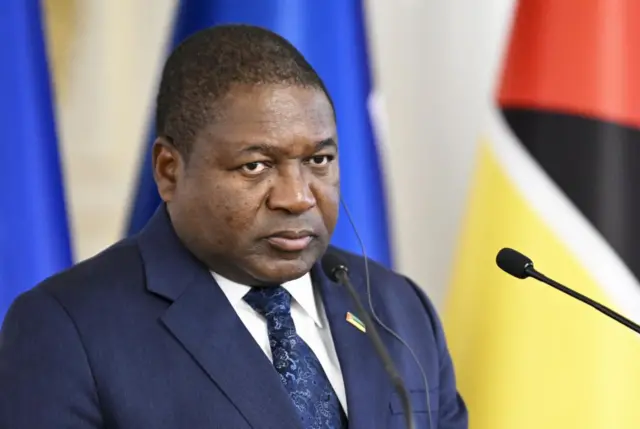 Image source, Getty Images
Image source, Getty ImagesThe move also seeks to address concerns over fair pay
The Mozambican cabinet has approved a bill proposing pay cuts for ministers, deputy ministers, state secretaries and MPs as the government grapples with a rising wage bill.
Finance and Economy Minister Max Tonela on Thursday said the proposal was also seeking to address concerns over provincial assemblies members’ salaries, which he said contradicted the principles of fair pay.
Mr Tonela said some of their salaries were significantly higher than those paid to other executives and specialised professionals.
He did not indicate the amount of the proposed cuts.
The pay cuts will not be applicable to the public servants whose salary was adjusted under the Unified Pay Scale (TSU) approved this year.
The move comes nearly two weeks after the International Monetary Fund highlighted the need for the government to reduce public wage expenditure.
The wage bill will be submitted to parliament for debate before it is passed into law.
Fardowsa Hanshi
BBC News Somali
The militant al-Shabab group on Friday morning carried out an attack on a Ugandan troops' base of the African Union Transition Mission (ATMIS) in Bulla Mareer district, in Lower Shabelle region in Somalia.
The attack began shortly after morning prayers. It started with a large explosion, believed to be an explosives-laden vehicle.
Buulo Mareer is about 110km (68 miles) from the capital, Mogadishu.
Residents reported that after the big explosion, two more explosions occurred in the camp, before a fight started between the Ugandan troops and the attackers.
Al-Shabab said they captured the camp and killed dozens of ATMIS soldiers, but there has been no independent confirmation of the group's claim.
ATMIS says its forces are currently assessing the security situation in the area but no word yet from the Somali government regarding the attack.
Ugandan army spokesperson Felix Kulayigye told Kenya's Daily Nation that the military was probing the attack. He blamed "foreign insurgents" for the raid without giving further details.
The actual damage caused by the attack is not yet known.
Civilians have remained inside their houses and though some of the bullets being fired hit their houses, no damage has been reported.
Some residents in Bulo Mareer told the BBC that they could hear the sound of helicopters hovering over the city.
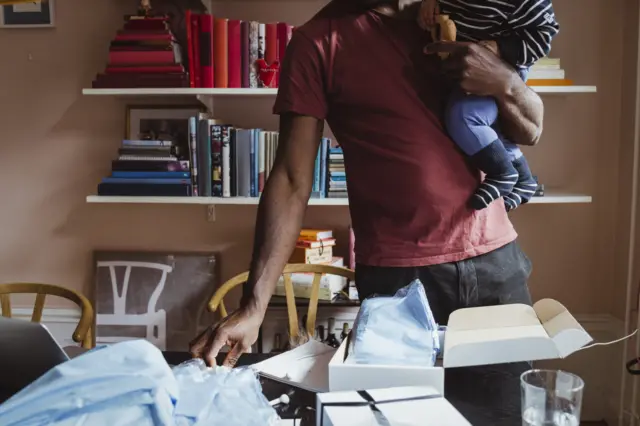 Image source, Getty Images
Image source, Getty ImagesThe MPs said the increase would give men more time to support their spouses
The Ugandan parliament has passed a bill that increases paternity leave from four to seven days to enable male working employees to help their spouses.
“It ought to be appreciated that if we wish to have a society where men play an increased supportive role to their spouses, it is important that more time be accorded to male employees to help their spouses,” Flavia Kabahenda, the chairperson of parliament's gender committee, said after the passage of the bill sponsored by the government.
The MPs said they borrowed a leaf from neighbouring Kenya which accords male working employees two weeks for paternity leave, state-owned New Vision reports.
The parliament, however, rejected a proposal to provide additional leave days from the current 60 days to 90 days for female employees who give birth to more than one child at the same time.
Attorney General Kiryowa Kiwanuka rejected the proposal describing it as extreme for the employers.
The bill has been forwarded to President Yoweri Museveni, who local media say is likely to assent it into law.
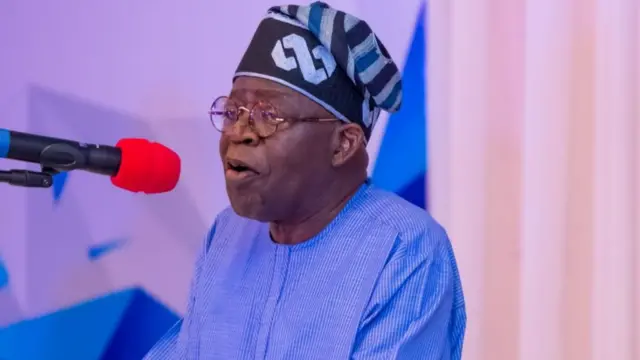 Image source, Bola Tinubu/Twitter
Image source, Bola Tinubu/TwitterAmbrose Owuru wanted the court to overturn Mr Tinubu's win
A Nigerian court has fined a former presidential candidate in the 2019 election for filing a suit to stop the inauguration of President-elect Bola Tinubu on 29 May.
The court ordered Ambrose Owuru, a lawyer, to pay $87,000 (£80,000) for pursuing a “strange” and “frivolous” suit.
Mr Owuru, who contested and lost in the 2019 presidential election, had urged the court to order that he be sworn in as president instead of Mr Tinubu.
The lawyer, who did not participate in the 2023 presidential election, claimed he won the 2019 presidential poll but was unjustly deprived of his victory.
Dismissing the suit in October 2019, the Supreme Court described it as an abuse of court process.
After Mr Tinubu was announced the winner of the 2023 presidential election, Mr Owuru filed another suit out of the facts of his 2019 case.
A three-member panel of the Court of Appeal in the capital Abuja dismissed the suit in a unanimous decision on Thursday.
Mark Pivac
BBC World Service Newsroom
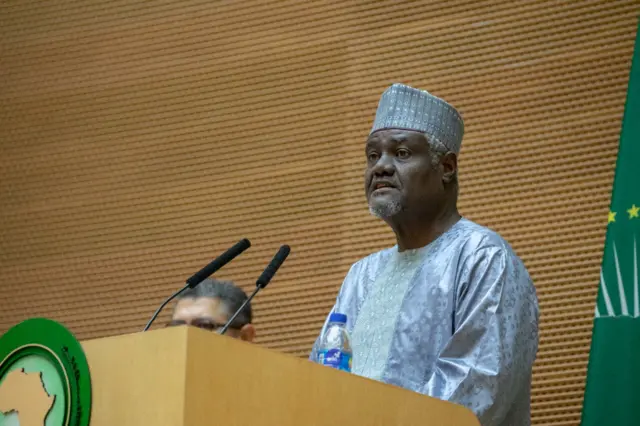 Image source, African Union/Twitter
Image source, African Union/TwitterAU Commission chairman, Moussa Faki Mahamat says Africa must resist the consequences of intensifying global rivalries
The African Union has warned that the continent risks becoming a geostrategic battleground for competing big power interests.
Its commission chairman, Moussa Faki Mahamat, said Africa must resist the consequences of intensifying global rivalries that he said threatened to create a new Cold War.
China, Russia, and the United States have all sent their top diplomats to Africa this year.
Ukraine's foreign minister is currently on a mission there.
The chairman's warning was given on the 60th anniversary of the formation of the African Union's predecessor, the Organisation of African Unity.
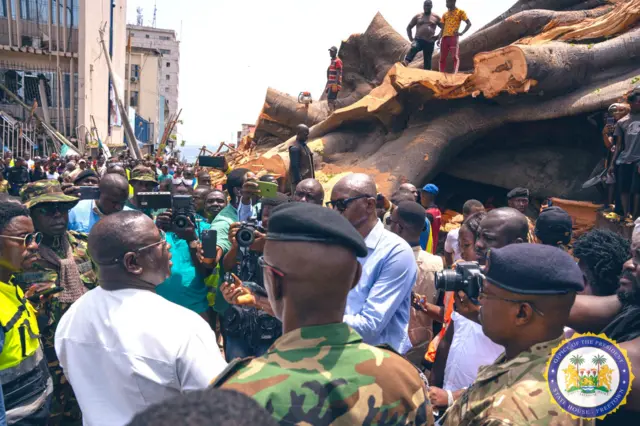 Image source, Julius Maada Bio/Twitter
Image source, Julius Maada Bio/TwitterPresident Julius Maada Bio visited the site of the fallen tree in the centre of Freetown
Sierra Leonean President Julius Maada Bio says parts of the iconic cotton tree that was brought down by a storm in the capital Freetown will now be preserved in a museum.
He said the tree, which stood for hundreds of years, wasn’t just a tree, but “a connection between the past, present and the future and we must strive to immortalise it”.
The preservation of the tree will be led by the tourism and cultural affairs ministry, he said, and would serve as a reminder of the country’s shared heritage and history.
Mr Bio spoke when he visited the site of the fallen tree in the centre of the city.
Earlier, the president had described the tree “as a great loss for the nation” and said the tree was a symbol of liberty for early settlers. It also appears on Sierra Leone banknotes.
The 70m (230 ft)-high cotton tree was said to be the oldest of its kind in the country - a government statement estimated it to be 400 years old.
Just 300m away are the Freedom Steps, climbed by newly arrived freed slaves who offered prayers at the tree before making Freetown their home.
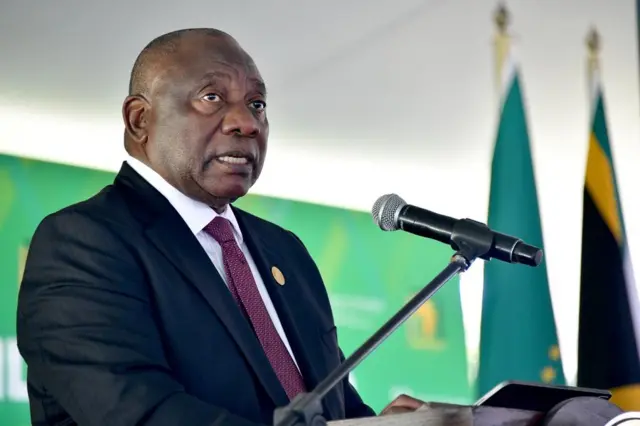 Image source, South Africa presidency/ Twitter
Image source, South Africa presidency/ TwitterThe president said his country was being threatened with penalties
South Africa's President Cyril Ramaphosa says his country will continue to resist calls to abandon its independent and non-aligned foreign policy.
Speaking on Thursday at an Africa Day celebration in Krugersdorp, west of Johannesburg, Mr Ramaphosa said the African continent was often dragged into conflicts far beyond its borders.
“South Africa has not been and will not be drawn into a contest between global powers. We will maintain our position on the peaceful resolution of conflict wherever those conflicts occur,” President Ramaphosa said.
South Africa’s relationship with the US, a key trade ally, has been strained since Pretoria took a non-aligned stance in the Russian war against Ukraine.
This was exacerbated by recent public statements made by the US ambassador to South Africa, Reuben Brigety, that the country had sold arms to Russia. President Ramaphosa agreed to investigate the allegations but said there was no concrete evidence to support them.
In his Thursday speech, the president said countries, including South Africa, were being “threatened with penalties” for pursuing an “independent foreign policy” and for adopting a position of non-alignment.
He did not, however, specify the penalties or who is threatening them.
President Ramaphosa said the continent had painful memories of foreign superpowers conducting "proxy wars on African soil".
The South African government is also under pressure to take a decision on Russian President Vladimir Putin, who is due to visit the country later this year.
The International Criminal Court (ICC) has issued a warrant for his arrest in connection with the Ukraine conflict.
Read more here:
 The Newsroom
The Newsroom
BBC World Service
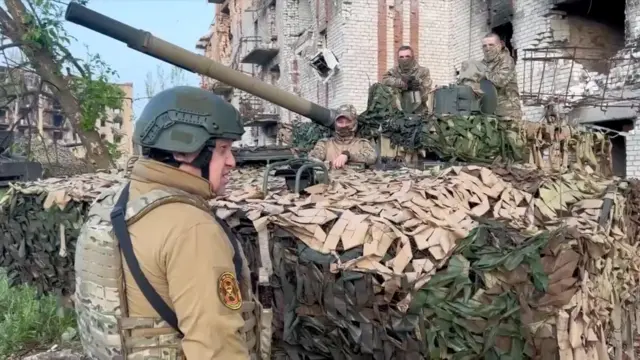 Image source, Reuters
Image source, ReutersThe US has designated Wagner as a transnational criminal organisation
The United States has imposed sanctions on a Russian man who it says is the leader of the Wagner mercenary group's operation in Mali.
The US Treasury said Ivan Maslov was a key figure in Wagner's global activities.
It said Wagner may be using its presence in Mali to conceal efforts to acquire military weapons and equipment for the war against Ukraine.
It also accused the Russian group of supplying anti-aircraft missiles to the Rapid Support Forces in Sudan.
Earlier this year, the US designated Wagner as a transnational criminal organisation.
The group has been helping Mali's military government fight Islamist insurgents.
“The Wagner Group’s presence on the African continent is a destabilising force for any country that allows for the deployment of the group’s resources into their sovereign territory,” the Treasury Department said in a statement.
Our proverb of the day:
Quote MessageWhen a ripe fruit sees an honest man it drops."
An Ngoni proverb sent by Khosa Jk Chambalo in Embangweni, Malawi
We'll be back on Friday morning
That's all from the BBC Africa Live team for now. We'll be back on Friday morning with the latest from around the continent.
In the meantime, you can get updates on BBCAfrica.com or listen to the BBC's Africa Today podcast.
A reminder of our wise words of the day:
Quote MessageThe dog barks after the hyena is gone."
Sent by Uhonoma Ogieva to BBC News Pidgin
Click here to send us your African proverbs.
And we leave you with this photo of Somali model Halima Aden arriving earlier at a American Foundation for Aids Research gala held in southern France on the side-lines of the Cannes Film Festival:
 Image source, AFP
Image source, AFPPriya Sippy
BBC Focus on Africa radio
The gigantic cotton tree that has been brought down in a storm in Sierra Leone’s capital, Freetown, has been described as country’s spine.
“For me it’s the spine that… holds us to Freetown and Sierra Leone,” Raymond de’Souza George, ambassador-at-large of heritage and culture in the president's office in Freetown, told the BBC’s Focus on Africa radio programme.
Freetown was founded as a home for repatriated former slaves in 1787.
“When the slaves came back, that was the first place they gathered to give thanks to God for the fact that they were safe on solid ground,” he told Focus presenter Esau Williams.
“Over the years the cotton tree has been a place for many activities - religious as well as cultural.”
Mr De’Souza George says people have attached spiritual powers to the cotton tree and over the past few years Christians have gathered there to pray for the nation.
Listen to the full interview here:
The tree stood for hundreds of years in Freetown
A Rwandan-born MTV choreographer has won plaudits on social media for posting a video clip earlier this week of her teaching Dr Tedros Ghebreyesus, the Ethiopian head of World Health Organization (WHO), some dance moves.
"I got @DrTedros dancing!" Sherrie Silver tweeted along with the video of her tutorial.
Dr Tedros later tweeted his thanks in Kinyarwanda, adding that "every move counts for health".
The WHO head also encouraged her on her quest to get other Africa leaders, like Rwanda's Paul Kagame, to give it a go.
"Murakoze Cyane. Thank you for giving me a dancing class, dear @SherrieSilver, external. I hope my friend, President @PaulKagame, external will give it a try as well. Every move counts for health."
Allow X content?
This article contains content provided by X. We ask for your permission before anything is loaded, as they may be using cookies and other technologies. You may want to read X’s cookie policy, external and privacy policy, external before accepting. To view this content choose ‘accept and continue’.
Priya Sippy
BBC Focus on Africa radio
A court in Kenya has ruled that a cash gift of about $738,000 (£599,000) sent to 23-year-old student Felista Nyamathira Njoroge by her Belgian boyfriend can be confiscated by the government.
The money was sent to her in 2021 by Marc De Mesel, a YouTube cryptocurrency enthusiast from Belgium.
However the large sum raised suspicion with authorities and Kenya's Asset Recovery Agency.
In December 2021, they ordered the freezing of the funds - and said they would only be released if the source of the money could be explained.
While Ms Njoroge alleges the money was acquired legitimately “through business and personal relationships”, in court the judge ruled that the source of the money had not been explained.
Esther Maina said it was likely that Ms Njoroge and Mr De Mesel were involved in a money-laundering scheme.
The money will now be given to the state.
Mr De Mesel had also come under scrutiny for transferring large amounts of money to several other women in Kenya.
 Richard Hamilton
Richard Hamilton
BBC World Service newsroom
The president of the Democratic Republic of Congo (DR Congo), Félix Tshisekedi, is visiting China, amid tension with Beijing over lucrative mining contracts.
President Tshisekedi wants to re-negotiate mining deals with Chinese companies.
He has said the $6bn (£4.9bn) contracts, originally signed in 2008, have benefited the Chinese far more than the Congolese.
China's embassy in Kinshasa has rejected the allegations.
Mr Tshisekedi is on a six-day visit to China, where he is expected to meet President Xi Jinping to review and sign several trade deals.
The DR Congo is the world’s largest producer of the battery material cobalt. It also has significant deposits of diamonds, gold, lithium and tantalum.
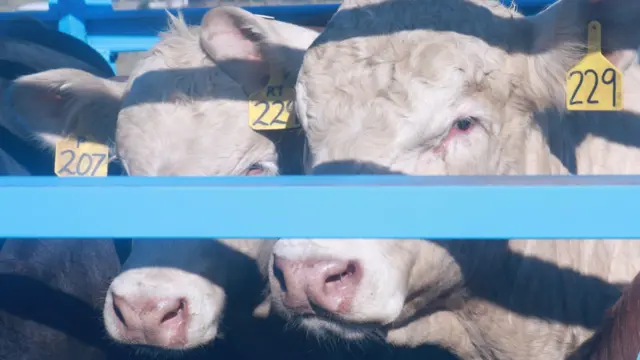 Image source, Botswana government/Facebook
Image source, Botswana government/FacebookWith the better breeders from the US, the government hopes to increase cattle herds
Botswana has imported 141 bulls and 21 heifers from the US state of Texas to help improve the productivity of local breeds.
"The live breeding cattle initiative will be supported with the use of the best technologies and equipment for improved efficiency," President Mokgweetsi Masisi said on Wednesday.
The cattle are said to be drought and disease resistant.
The move has been applauded by some - given the importance of cattle to the country.
But at a cost of $1.8m (£1.7m) others on social media have questioned whether it is a priority.
"It's a good initiative for the wealthy, not all people have cattle, prioritise. Health sector is on its knees, education is at its worst," Vincent Rouncivell said on Facebook.
Velly Best Mpopelang posted: "Rather than buying 162 at once, why didn’t we buy a small number for trials first to see how they acclimatise to our weather and type of feeds we use here?"